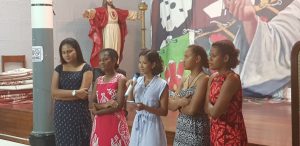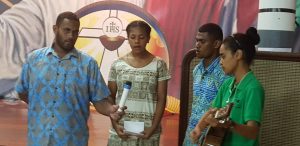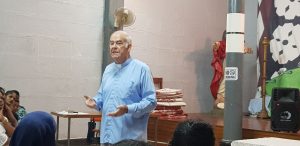Interfaith Youth Speak Up – Fasting
Fr Pat Colgan, Fiji
Interfaith Youth Speak Up
“And on that day they will fast” (Mt 9:15)
A most interesting Fijian youth interfaith encounter occurred on the “Leap Year” day of 29th February 2020, at the crypt of the Sacred Heart Cathedral in Suva. It was a sharing by youths from various churches and religions on the meaning and practice of fasting in their traditions and in their own lives. It was organised by the Columban Interfaith Ministry desk, Fiji. The following are snippets of the rich mosaic of the young peoples’ reflections:
The Satya Sai Organisation representative explained to us that the Sanskrit word for fasting ‘upasanaa’, really means ‘living in the presence of God’, and that abstinence, while not obligatory, is a powerful act of purification and provider of strength in trials. She quoted Sai Baba as having said that s/he who eats but once a day (and ideally only the amount of rice that can be contained in the palm of one’s hand) is worthy to be called a ‘Yogi’ (true devotee of God). Such a person ‘never wastes time’ (but works continually for God), ‘never wastes money’ (offering it instead to the poor) and ‘never wastes energy’ (which should be reserved for selfless service). Although Baba did not impose fasting on himself, he ate very little all his life, and thus proved himself a Yogi.
 The Baháʼí representative commented on the coincidence of 29th Feb being, this year, the first day of the Nineteen-Day annual fast, during which members of the Baháʼí Faith adhere to a sunrise-to-sunset abstinence from food. Along with obligatory prayer, it is one of the greatest obligations of a Baháʼí, and its chief purpose is spiritual; to reinvigorate the soul and bring the person closer to God. She described fasting as ‘recalibrating our souls’ and ‘rediscovering our balance’. The 3 young Baháʼí ladies then finished by singing a plaintive Fijian chant to ‘the Son of God’.
The Baháʼí representative commented on the coincidence of 29th Feb being, this year, the first day of the Nineteen-Day annual fast, during which members of the Baháʼí Faith adhere to a sunrise-to-sunset abstinence from food. Along with obligatory prayer, it is one of the greatest obligations of a Baháʼí, and its chief purpose is spiritual; to reinvigorate the soul and bring the person closer to God. She described fasting as ‘recalibrating our souls’ and ‘rediscovering our balance’. The 3 young Baháʼí ladies then finished by singing a plaintive Fijian chant to ‘the Son of God’.
The three youth from Centenary Methodist Church quoted Matthew 6:16-17, Jesus’ instruction that our fasting (as well as prayer and almsgiving) be always secret. Fasting reveals our inner sinfulness, strengthens our intimacy with God and heals the hurts we have caused others. His companion mentioned two types of fasting she said are common among Methodist youth: ‘Daniel’ fasting (only fruits, nuts and vegetables – for 21 days), and ‘Esther’ fasting (no food or water for 3 complete days). In turn, her companion spoke of the unpleasant initial sensations associated with fasting (bad odours in one’s mouth, for example), but that the goal is that our body be docile to the Holy Spirit (like the stallion to its rider) – not the other way around! Like the Baháʼí , they graced us with an acapella song.
 There were a number of youth groups associated with the Fiji Muslim League. A young man spoke movingly of Ramadan being like associating ourselves with the hunger of a poor mother who deprives herself in order to feed her starving child. The Ramadan fast is not just from food, but from anger, hatred and selfishness – and what better time to give ‘zakat’ (alms) as a sign of solidarity with the poor. A number of young ladies from the Fiji Womens’ Muslim League explained the difference between the festivals of Eid ul-Fitr (end of Ramadan) and Eid al-Adha (or ‘the Eid of Sacrifice’), remembering Abraham’s sacrifice of his son as an act of obedience to God But, before Abraham could make his sacrifice, God provided a goat instead. In commemoration of this intervention, an animal is sacrificed ritually and divided into three parts. One share is given to the poor and needy, another is kept for home, and the third is given to relatives.
There were a number of youth groups associated with the Fiji Muslim League. A young man spoke movingly of Ramadan being like associating ourselves with the hunger of a poor mother who deprives herself in order to feed her starving child. The Ramadan fast is not just from food, but from anger, hatred and selfishness – and what better time to give ‘zakat’ (alms) as a sign of solidarity with the poor. A number of young ladies from the Fiji Womens’ Muslim League explained the difference between the festivals of Eid ul-Fitr (end of Ramadan) and Eid al-Adha (or ‘the Eid of Sacrifice’), remembering Abraham’s sacrifice of his son as an act of obedience to God But, before Abraham could make his sacrifice, God provided a goat instead. In commemoration of this intervention, an animal is sacrificed ritually and divided into three parts. One share is given to the poor and needy, another is kept for home, and the third is given to relatives.
The majority Hindu group in Fiji is known as the Shri Sanatan Dharm, and their youth spoke of how devotees fast of different days according to their particular devotion, whether to Lord Shiva (on Mondays), Hanuman (Tuesdays), Durga Mata (Friday). Fasting is also associated with the festivals of Shiu Rat Rii, Nauv Rat Rii, Diwali and Holi – and women often fast, particularly from rice, for the long life of their husbands on ‘Ekadashi’ which falls every month twice on the waxing and waning phase of the moon. (There are 24 ekadashis in a year and each day is dedicated to Lord Vishnu).
 Catholic youths from Sacred Heart and St Pius X parishes shared that fasting is always a matter between one’s self and God; it must always be accompanied by prayer to be effective; although ‘private’, it can sometimes be good to do it with a friend, in order to give each other strength and encouragement. One young man movingly spoke of his prayer with fasting for 6 years having effected a reconciliation with his father, while a young mother said that fasting helped her to heal, move on from hurts, and be more patient in her studies to be a teacher.
Catholic youths from Sacred Heart and St Pius X parishes shared that fasting is always a matter between one’s self and God; it must always be accompanied by prayer to be effective; although ‘private’, it can sometimes be good to do it with a friend, in order to give each other strength and encouragement. One young man movingly spoke of his prayer with fasting for 6 years having effected a reconciliation with his father, while a young mother said that fasting helped her to heal, move on from hurts, and be more patient in her studies to be a teacher.
Finally the Hare Krishna group leader spoke of how, although we take care to wash our bodies, our interior is still affected by ‘false ego’; our minds are easily contaminated, and that lust, anger and greed are like three wild animals running around in our heads. We quite literally ‘are what we eat’; humans are less like the bees who only take the amount of nectar they need from any plant, and more like flies, who gad about from place to place; we are also like crabs who keep pulling each other down and backwards, to stop any one of them advancing. The same Hare Krishna group most kindly prepared dinner for all of us that same evening, and accompanied it with kirtan singing.
 Fr Frank Hoare, Columban Interfaith mentor in Fiji, thanked all the youths for their both informative and heartfelt sharing. He was impressed by their honesty that, perhaps most of all, they need to fast from or reduce their use of social media, so that they can re-devote their energies to getting Fiji back to, in the words of Pope John Paul II on his 1986 visit, ‘the way the world should be’.
Fr Frank Hoare, Columban Interfaith mentor in Fiji, thanked all the youths for their both informative and heartfelt sharing. He was impressed by their honesty that, perhaps most of all, they need to fast from or reduce their use of social media, so that they can re-devote their energies to getting Fiji back to, in the words of Pope John Paul II on his 1986 visit, ‘the way the world should be’.

